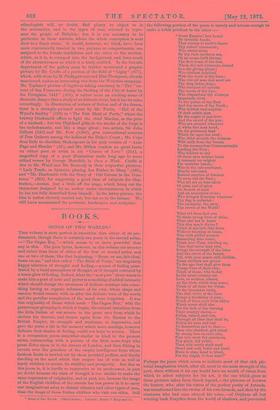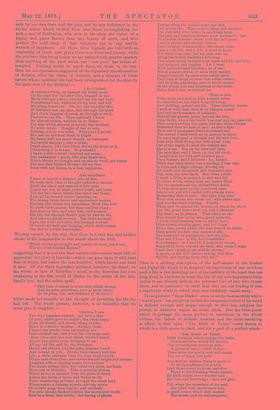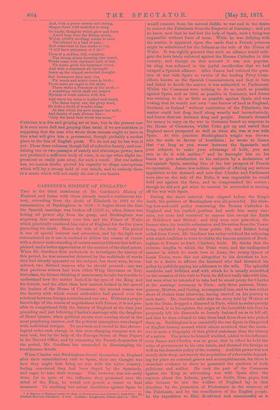BOOKS.
SONGS OF TWO WORLDS.*
Tau volume is more perfect in execution than either of its pre- decessors, though there is certainly one poem in the second series, —"The Organ Boy,"—which seems to us more powerful than any in this. The pure lyrics, however, in this volume are sweeter and richer than those of either of the first or second series, and one or two of them, like that beginning, "Beam on me, fair ideal, beam on me," and that called " The Birth. of Verse," are singularly happy mixtures of thought and feeling,—poems of feeling pene- trated by a lucid atmosphere of thought, or of thought coloured by a warm glow of feeling. Indeed, what the "new poet" alone wants to make him a poet of note and power is something of added intensity which should change the sweetness of delicate musings into some- thing having an organic substance of its own, whose shape and essence would remain with us after the delicate turn of the words and the peculiar complexion of the mood were forgotten. It was this originality of theme which made "The Organ-Boy," with the picturesque grouping in which it began, the natural transition from the little Italian of our streets to the great race from which he derives his descent, and thence again from the Roman to the British Empire, its strength and weakness, so impressive, and gave the poem a life in the memory which mere musings, however delicate their shades of feeling, could not hope to secure. There is a companion poem somewhat similar in kind in the present series, commencing with a picture of the little news-boys who press Echos upon us in the streets of London, and then flitting in reverie over the grandeur of the empire intelligence from whose farthest limits is bawled out by these youthful pedlars, and finally dwelling on the need which that empire has of wise as well as hardy children to secure its stability and prosperity. But fine as this poem is, it is hardly so impressive as its predecessor, in part no doubt because the train of thought is too similar to make the same impression of originality, and in part, too, because the image of the English children of the streets has less power in it to carry our imaginations away to distant climates and other types of men, than the image of those Italian children who visit our cities. Still
• Songs of Two Worlds. (Third Series.) London: Henry S. King and Co.
the following portion of the poem is stately and intense enough-to make a noble pendant to the other :—
"Great Empire! fast bound
By invisible bands, That convey to earth's limits Thy rulers' commands; Who sittest alone By thy rude northern sea, On an ocean-built throne, The first home of the free, Whom thy tall chimneys shroud In a life-giving gloom ; Who clothest mankind With the work of thy loom; Who o'er all seas (lost send out Thy deep-laden ships; Who teachost all nations The words of thy lips; Who dispatchest thy viceroys Imperially forth To the palms of thy East And the snows of thy North ; Who boldest vast empires Of dark subtle men By the might of just laws And the sword of the pen; Who are planted wherever A white foot may tread, .
On the poisonous land Which for ages lies dead; Who didat nourish the freeman With milk from thy breast, To the measureless Commonwealth Lording the West ; Who boldest to-day Of those once subject lands A remnant too mighty For weaklier hands ; Who in thy isle-continent, Hourly increased, nearest empires of freemen To sway the far East ; Who art set on lone islets Of palm and of spice, On deserts of sand And on mountains of ice ; Who bring'st Freedom wherever Thy flag is unfurled : The exemplar, the envy, The crown of the World!
What is't thou dost owe To these young lives of thine, What else but to foster This dim spark divine Think of myriads like these Without teaching or home, Who with pitiful accents Beseeching thee come; Think how Time, whirling on, Time that never may rest, Brings the strength of the loins And the curve of the breast, Till, with poor minds still childish, These children are grown To the age that shall give them Young lives of their own ; Think of those, who to-day In the sweet country air Live, as soulless, almost, As the birds which they scare; Think of all those for whom, To the immature brain, The dull whirr of the loom Brings a throbbing of pain; Think of those poor lives fallen Which never shall rise For the lack of the warning
Their country denies,—
Fallen, ruined, and lost, Through all time that shall be, Fallen for ever and lost To themselves and to thee ;— Thou who standest, girt round By strong foes on each side, Foes who envy thy greatness, Thy glory, thy pride; Thou, who surely shalt need Heart and soul, brain and band, Brain to plan, hand to bleed, For thy might, 0 dear land !"
Perhaps the poem which seems to indicate most of that rich pic- torial imagination which, after all, must be the main strength of the poet, since without it his eye would have no wealth of vision from which to select subjects for his art, is the one which gives us three pictures taken from Greek legend,—the pictures of Actaeon the hunter, who, after his vision of the perfect purity of Artemis, was transformed into the victim of his own hounds, and slain by the creatures who had once obeyed his voice,—of Orpheus all but 1 winning back Eurydice from the world of shadows, and prevented
only by her own fears and his pity, not by any deficiency in the divine music which swelled from him, from accomplishing the task,—and of Endymion, who sees in his sleep the -vision of a higher and purer beauty than any beauty of earth, and who prefers the cold sleep of that visionary joy to any earthly warmth of happiness. All these three legends are told with an originality of touch that gives them new force and beauty, while the pictures they bring before us are painted with greater mastery than anything of the kind which our "new poet" has before at- tempted. Nothing could be much finer, we think, in its way, than the interpretation suggested of the legendary transformation of Actreon, after his vision of Artemis, into a creature of lower nature whose spiritual life had been extinguished for the time by the mere rays of the divinity :—
" As I looked A radiance white, as beamed the frosty moon On the mad boy and slew him, beamed on me ; Made chill my pulses, checked my life and heat; Transformed me, withered all my soul, and left
My being barnt out. For lo the dreadful eyes Of Godhead met my gaze, and through the mask And thick disguise of sense, as through a wood,
Pierced to my life. Then suddenly I knew An altered nature, touched by no desire
For that which showed so lovely, but declined
To lower levels. Nought of fear or awe, Nothing of love was mine. Wide-eyed I gazed, But saw no spiritual beam to blight
My brain with too much beauty, no undraped
And awful majesty; only a brute,
Dumb charm, like that which draws the brute to it, Unknowing it is drawn. So gradually
I knew a dull content o'ercloud my sense,
And unabashed I gazed, like that dumb bird
Which thinks no thought and speaks no word, yet fronts
The sun that blinded Homer—all my fear
Sunk with my shame, in a base happiness.
And sometimes
I seem to myself a thinker, who at last,
By some dark lake of thought unknown, unseen, Amid the chase and capture of low ends, Comes one day on some perfect truth, and looks Till the fair vision blinds him heart and brain, And, all his former nature hurrying on, The strong brute forces and unchecked desires, Finding him bound and speechless, think him now No more their master, but some soulless thing; And leap on him, and seize him,•and possess His life, till through death's gate he pass to life, And his own ghost revives. But looks no more Upon the truth unveiled, but through a cloud Of creed and faith and longing, which shall change One day to perfect knowledge."
We may remark, by the way, that there is a very fine and sudden stroke of the imagination in that touch about the bird,
"Which thinks no thought and speaks no word, yet fronts The sun that blinded Homer,"
suggesting that it is not the finer nature—the nature most able to appreciate the glory it beholds—which can gaze upon it with least fear of injury, but rather the less sensitive, which knows not what it sees. Of the three legendary pictures, however, the finest, on the whole, is that of Fairydice's mind, as she describes her own awakening in the dim world of Hades to the music of her hus- band's lyre, and the subtle spell,
"Part born of dread to cross that sullen stream And its grim guardians, part of secret shame Of the young airs and freshness of the earth,"
which made her tremble at the thought of revisiting the life she had left. The whole picture, however, is so beautiful that we must give it complete:—
"Sudden I saw Two who together walked: one with a lyre Of gold, which gave no sound; the other hung Upon his breast, and closely clung to him, Spent in a tender longing. As they came,
I heard her gentle voice recounting o'er Some ancient tale, and these the words she said :
'Dear voice and lyre now silent, which I heard
Across yon sullen river, bringing to me All my old life, and he, the ferryman,
Heard and obeyed, and the grim monster heard
And fawned on you. Joyous thou earnest and free
Like a white sunbeam from the dear bright earth, Where suns shone clear, and moons beamed bright and streams Laughed with a rippling music (nor as here The dumb stream stole, the veiled sky slept, the fields Were lost in twilight). Like a morning breeze, Which blows in summer from the gates of dawn Across the fields of spice, and wakes to life
Their slumbering perfume, through the silent land Where scarce a footstep sounds, nor any strain Of earthly song, thou cam'st: and suddenly
The pale cheeks flushed a little, the murmured words Rose to a faint, thin treble ; the throng of ghosts
Pacing along the sunless ways and still, Felt a new life. Thou tamest, dear, and straight The dull cold river broke in sparkling foam, The pale and scentless flowers grew perfumed ; last To the dim chamber, where with the sad queen I sat in gloom, and silently inwove Dead wreaths of amaranths ; thy mnsio came Laden with life, and I, who seemed to know Not life's voice only, but my own, rose up, Along the hollow pathways following The sound which brought back earth and life and love, And memory and longing. Yet I went With half-reluctant footsteps, as of one Whom passion draws, or some high fantasy,
Despite himself, because some subtle spell, Part born of dread to cross that sullen stream
And its grim guardians, part of secret shame
Of the young airs and freshness of the earth,
Being that I was, enchained me.
'Then at last,
From voice and lyre so high a strain arose
As trembled on the utter verge of being,
And thrilling, poured out life. Thus *lowlier drawn
I walked with thee, shut in by halcyon sound And soft environments of harmony, Beyond the ghostly gates, beyond the dim,
Calm fields, where the beetle hummed and the pale owl
Stole noiseless from the copse, and the white blooms
Stretched thin for lack of sun : so fair a light Born out of consonant sound environed me.
Nor looked I backward, as we seemed to move
To some high goal of thought and life and love, Like twin birds flying fast with equal wing
Out of the night, to meet the coming sun
Above a sea. But on thy dear fair eyes,
The eyes that well I knew on the old earth,
I looked not, for with still averted gaze Thou 'oddest, and I followed; for, indeed,
While that high strain was sounding, I was rapt
In faith and a high courage, driving out
All doubt and discontent and womanish fear, Nay, even my loveitself. But when awhile
It sunk a little, or seemed to sink and fall To lower levels, seeing that use makes blunt
The too accustomed ear, straightway desire
To look once more on thy recovered eyes Seized me, and oft I called with piteous voice, Beseeching thee to tarn. But thou long time
Wert even as one who heard not, with grave sign
And waving hand denying. Finally,
When now we neared the stream, on whose far shore
Lay life, great terror took me, and I shrieked Thy name, as in despair. Then thou, as one Who knows him set in some great jeopardy,
A swift death fronting him on either hand, Didst slowly turning gaze ; and lo I I saw Thine eyes grown awful, life that looked on death,
Clear purity on dark and cankered sin,
The immortal on corruption,—not the eyes
That erst I knew in life, but dreadfuller And stranger ; as I looked, I seemed to swoon,
Some blind force whirled me back, and when I woke
I saw thee vanish in the middle stream,
A speck on the dull waters, taking with thee
My life, and leaving Love with me.'"
That is a striking description of the half-shame of the fresher and higher life which is so frequent an experience of one on whom such a life is just dawning, and of the inability of the heart that has long lived in shadows to trust the stir of the new impulses it feels, unless it can directly fathom the personal love of him who rouses them, and so guarantee to itself that they are not leading it into a capricious world in which they may suddenly vanish away.
These pictures "from Hades" seem to us the best security which "a new poet" has yet given us that the imaginative food of his mind is definite enough and ample enough to find him subjects for poetry, in whatever region he seeks them. But the little poem which is perhaps the most perfect in execution in the whole volume, the fullest of delicate touches, and the most satisfying in effect, is that upon "The Birth of Verse," every stanza in which is a little poem in itself, and yet a part of a perfect whole
" THE BIRTH OF VERSE.
Blind thoughts which occupy the brain,
Dumb melodies which fill the air, Dim perturbation, precious pain,
A gleam of hope, a chill of fear,— These seize the poet's soul, and mould The ore of fancy into gold.
And first no definite thought there is In all that affluence of sound, Like those sweet formless melodies Piped to the listening woods around, By birds which never teacher had
But love and knowledge : they are glad.
Till, when the chambers of the soul Are filled with inarticulate airs, A spirit comes which cloth control The music, and its end prepares ;
And, with a power serene and strong, Shapes these wild melodies to song.
Or haply, thoughts which glow and burn Await long time the fitting strain, Which, swiftly swelling, seems to turn
The silence to a load of pain ; And somewhat in him seems to cry, I will have utterance, or I dio!'
Then of a sudden, full, complete, The strong strain bursting into sound, Words come with rhythmic rush of feet, Fit music girds the language round, And with a sweetness all unsought Soars up the winged embodied thought.
But howsoever they may rise, Fit words and music come to birth ; There soars an angel to the skies, There walks a Presence on the earth,— A something which shall yet inspire Myriads of souls unborn with fire.
And when his voice is hushed and dumb, The flame burnt out, the glory dead, He feels a thrill of wonder come At that which his poor tongue has said ; And thinks of each diviner line- ' Only the hand that wrote was mine.'"
Criticism is a dim and groping art at best, but in the present case it is even more dull and groping than usual, if we are mistaken in supposing that the man who wrote those stanzas ought to have in him what will give him a permanent, though probably a modest place in the line of English poets. We do not say he has won it yet. These three volumes, though full of reflective beauty, and con- taining one or two passages of stately and statuesque power, have not produced a sufficient body of verse, in an age when slight im- pressions so easily pass away, for such a result. . But our author has, we cannot doubt, proved his capacity to shape conceptions which will lay a strong hold of our minds, and to embody them in a music which will not easily die out of our hearts.




































 Previous page
Previous page